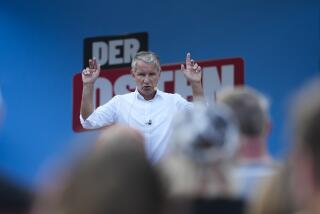E. German Prime Minister Expects Early Reunification : Diplomacy: De Maiziere tells Parliament that unity talks with Bonn should be completed by July.
- Share via
EAST BERLIN — East Germany’s new prime minister, Lothar de Maiziere, charted a path to swift reunification Thursday, saying negotiations with West Germany should be complete by July.
But De Maiziere also told the Volkskammer, or Parliament, that merger of the two countries’ social, economic and monetary systems must not leave East Germans feeling “like second-class citizens.”
“The union must come as quickly as possible,” he said, “but its basis must be as good, as reasonable and as resilient as necessary.”
“In the next eight to 10 weeks, we want to lay down the foundation for the economic, currency and social union,” De Maiziere said.
In his wide-ranging policy statement, he also sought to soothe Soviet anxieties and rekindle flagging West German sympathy.
Without referring directly to the thorny issue of NATO membership for a united Germany, he promised that East Germany would protect Warsaw Pact security concerns in its negotiations.
“Germany lies in the heart of Europe but must never again elevate itself into the center of European power,” De Maiziere said in his 31-page speech.
The prime minister reiterated demands that Bonn replace the virtually worthless East German mark with the strong western deutschemark at a rate of 1 to 1.
West Germany’s central Bundesbank favors a 2-to-1 rate, warning that an even exchange could spawn higher taxes, interest rates and inflation.
Such forecasts have somewhat dampened popular enthusiasm for the merger in West Germany.
“Bear in mind that we had to carry the heavier burden of German history during the past 40 years,” De Maiziere said, referring to Stalinist oppression that gnawed away at both the East German spirit and economy.
“East Germany had no . . . Marshall Plan relief,” he added.
Although reunification will be costly, De Maiziere acknowledged, East Germany “expects togetherness and solidarity.”
East Germany sees reunification as the only chance to save a ruined economy, ailing environment and disillusioned population.
The number of East Germans emigrating to West Germany has dropped significantly since the Communists lost their ruling monopoly, but West German border police say a few hundred still make the move daily.
“We will be asked: Do you have nothing at all to bring into this German union? And we answer: Indeed we do!” De Maiziere said. “We bring our land and our people. We bring . . . our skills and our gift for improvising. Necessity is the mother of invention.”
“We will work long and hard, but we still need the sympathy and solidarity you showed us last fall,” he added.
After the Berlin Wall was opened Nov. 9, West Germans welcomed their neighbors across the border with bouquets, fistfuls of cash, free guest rooms and tears of joy. While polls show that an overwhelming majority of Germans on both sides of the border favor rapid reunification, the Western welcome clearly shows signs of wearing thin.
West Germans worry about the strain that hundreds of thousands of refugees already have placed on delicate job and housing markets, causing some states to close their doors to new settlers.
In West Berlin, the constant flow of East German “day-trippers” means long lines in grocery stores, increased competition for precious few parking places and a reported surge in shoplifting.
To East Germans, the tantalizing world they always called drueben , or “the other side,” poses as many new dangers as opportunities. A young East German couple shopping in West Berlin this week followed the innocent custom of their hometown and left their newborn son sleeping in his carriage while they ducked into a dime store. The baby was gone when they returned 15 minutes later.
Police acting on a tip found him unharmed in a West Berlin apartment the following day and arrested a woman on kidnaping charges.
De Maiziere’s framework for reunification comes amid the first round of Cabinet-level talks between the two governments.
The World War II Allies--the United States, France, Britain and the Soviet Union--are expected to enter the talks within the next few weeks to determine the military future of a united Germany.
Bonn welcomed De Maiziere’s speech as a promising sign.
“It was an impressive message for a democratic renewal with a free, lawful and socially responsible policy,” said Chancellor Helmut Kohl’s spokesman, Dieter Vogel. Kohl is on vacation in Austria.
De Maiziere seemed determined to put Moscow at ease a day after the Soviets reportedly spelled out concerns about the speed and direction of unification in an unofficial note to East Berlin.
Moscow opposes the West German demand that a united Germany be a member of the North Atlantic Treaty Organization. East Germany is a member of the Soviet-led Warsaw Pact.
De Maiziere noted that East Germany has Soviet President Mikhail S. Gorbachev and his policy of reform to thank for its newfound freedom.
“We ask the citizens of the Soviet Union not to look upon the policies of East Germany and its drive for German unity as threatening,” he said.
More to Read
Sign up for Essential California
The most important California stories and recommendations in your inbox every morning.
You may occasionally receive promotional content from the Los Angeles Times.













